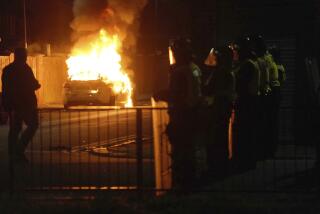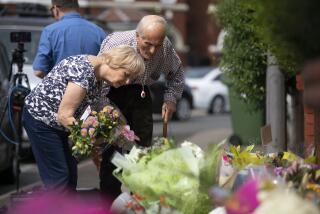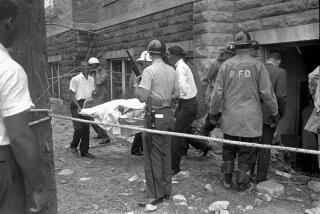Egypt Questions Chemist on Attacks
CAIRO — Egyptian police Friday night were interrogating a 33-year-old biochemist seized here in connection with last week’s London bombings as relatives denied that he had anything to do with the deadly suicide blasts.
Cairo police seized Magdy el-Nashar at his parents’ home in Bassateen, a poor suburb of the capital, the Egyptian Interior Ministry said in a statement. The doctoral graduate, who once studied chemical engineering in North Carolina, denied any connection to the attacks and said he was in Cairo on vacation, the ministry reported.
The University of Leeds biochemistry teacher has been identified in the British media as the man who rented a Leeds apartment, which police called a “bomb factory,” where the explosives for the London attacks are thought to have been assembled. Police sources quoted in British newspapers said investigators now believed the explosive used was TATP, or triacetone triperoxide, a compound that can be made from easily purchased chemicals and is similar to the material used by attempted “shoe bomber” Richard Reid.
In a separate news report Friday, El-Nashar was tied to one of the four suspected suicide bombers described by police here as “foot soldiers” in an international terrorist plot they believed would eventually be traced to Al Qaeda. Three of the suspects who police believe perished in the subway and bus bombings were British-born Pakistanis from Leeds. El-Nashar was said to have been a friend and former roommate of the fourth, Lindsey Germaine, a convert to Islam of Jamaican descent who lived in Aylesbury, about 140 miles miles away from the other suspects.
British newspapers also reported Friday that the three Leeds suspects had been banned from their local mosque, and authorities were investigating links between the suspects, who took at least 50 lives in the July 7 attacks, and Al Qaeda figures in Pakistan.
As El-Nashar was questioned by Egyptian authorities, it was unclear whether there were immediate plans to extradite him to Britain.
“We are aware of an arrest made in Cairo but are not permitted to disclose who we may or may not wish to interview in connection with this investigation,” Scotland Yard said in a statement. “This remains a fast-moving investigation with a number of lines of enquiry, some of which may have an international dimension.”
In Cairo, El-Nashar’s brother, Mohammed, 28, said Friday night that Nashar had been taken into custody Thursday afternoon as he walked to the neighborhood mosque to pray. Police then stormed the family’s third-floor walk-up and seized El-Nashar’s computer, papers and dissertation, he recounted.
El-Nashar had arrived home from Britain on June 30, his brother said. He’d come to visit his family and register his doctorate with the Egyptian government. He was staying with his parents, brother and sister on a dirt road of fading tenements, a scruffy street with no name, lighted by bulbs strung on wires.
Neighbors on the south edge of Cairo described El-Nashar as a quiet homebody who shied away from sports and spent little time mingling in the streets. He is the oldest of the three children; his father is a retired office worker for Arab Contractors, one of the region’s largest construction firms.
“He was one of the friendliest people I’ve known in my life, really exceptional,” said a 22-year-old neighbor who gave his name only as Gamal. “He was very responsible, and everybody was fond of him.”
Neighbors and family members here rejected the idea of El-Nashar as a religious extremist. His brother, a keyboard player who sometimes provided accompaniment for belly dancers, argued that El-Nashar wouldn’t have allowed him to keep his job if he were a fundamentalist.
“The furthest extent of his religion is that he prayed,” Mohammed El-Nashar said. “That’s all our family does, and there’s nothing wrong with prayer.”
El-Nashar had told his family that he would return to Britain in another month, his brother said, and that he planned to continue his academic work.
“If he were here, you’d probably like him,” his brother said. “Ask anybody. Muslims and Christians liked him. He was a peaceful man.”
El-Nashar, it was learned Friday, had been awarded a $58,000 government grant to study in England.
“We can confirm that Dr. Magdy el-Nashar was awarded a Bioscience Yorkshire Fellowship, supported by Yorkshire Forward in 2004,” the government-funded local development agency said in a statement. “The fellowship was to assist his investigation into developing a new biocatalyst and to take such a product to market for industrial use.”
The three Pakistani Briton suspects from Leeds, at least two of whom traveled to Pakistan for Islamic studies in recent years, may have met an Al Qaeda recruiter and strategist there, the Times of London reported Friday.
The Leeds-area suspects had been identified this week, with police linking two of them to blast scenes through forensic evidence from recovered remains. The third Leeds suspect, Mohamed Sidique Khan, 30, is believed to have carried out the deadliest of the four blasts, on the Piccadilly Line subway, but police have yet to find forensic evidence.
The fourth bombing suspect was identified late Thursday by a high-ranking British anti-terrorism investigator as Germaine, a 19- or 20-year-old Briton who converted to Islam four years ago.
The Evening Standard newspaper Friday quoted a man described as a friend of El-Nashar as saying that Germaine frequented El-Nashar’s apartment in Leeds as well as the nearby Grand Mosque in the Hyde Park neighborhood of the northern English industrial city.
“I believe they met for the first time in the prayer room of Leeds University,” architect Abed Shad said, according to the newspaper. He described Germaine, who was believed to have set off explosives in the King’s Cross Underground, as “a big, powerfully built man, not fat but muscular,” who wore traditional Muslim clothing.
A search of the alleged bomb-making venue Tuesday turned up evidence of explosives consistent with those used in attacks by Al Qaeda operatives and similar to the material Reid was trying to ignite when he was seized by flight attendants and passengers aboard a Paris-to-Miami flight in late 2001, the Times of London reported. The newspaper said the TATP had been refined and made more powerful for use against the transport facilities.
Police in Leeds continued searching the apartment rented by El-Nashar and also raided a community center and Islamic bookstore near the home of one of the two suspects known to have died in the attacks, Shahzad Tanweer.
The 22-year-old who spent several months this year in Pakistan and Afghanistan pursuing Islamic studies has been identified as the suspect in the bombing of a Circle Line Underground train at the Aldgate East station. Police seized a computer from the community center and were investigating whether the Leeds suspects had been inspired by radical literature or clerics.
The BBC and other media outlets reported that a known Al Qaeda operative entered Britain two weeks before the London attacks, despite his name being on a terrorism watch list. Asked about the reports that the unidentified figure entered by ferry and was left to travel the country without close surveillance, Metropolitan Police Chief Ian Blair said there was nothing to connect the man to the London case.
Blair conceded in the television interview, however, that police expect to eventually find an Al Qaeda connection. He described the four suicide bombing suspects as foot soldiers in the global terrorist network.
“What we’ve got to find is who encouraged them, who trained them and who’s the chemist,” Blair told the BBC.
The police chief also confirmed that investigators were looking into Pakistani connections but gave no details.
The Egyptian Interior Ministry said Friday that El-Nashar had professed his innocence and pointed out that he had left most of his belongings back in Leeds and had planned to return at the end of a six-week vacation.
El-Nashar received his undergraduate degree from Cairo University in 1994 and studied at North Carolina State University for a semester in 2000 before opting to pursue his doctorate in Leeds, where he has lived for the last five years.
At the Islamic Center of Raleigh on Friday night, near the North Carolina campus, an Islamic community leader said El-Nashar had attended services there five years ago.
“He would come here for Friday prayers,” Hisham Sarsour said. “Afterwards, he would stand outside with the small cliques of Egyptian graduate students.”
Sarsour said El-Nashar did not have a prominent role in the Islamic Assn. of Raleigh. “There was nothing distinctive about him,” he said.
In other developments, the family of the 18-year-old who police say blew up the No. 30 bus in Tavistock Square issued an anguished statement of disbelief and apology.
Mahmoud and Maniza Hussain and their three surviving children said they were devastated by the news that their son Hasib was thought to be behind the blast that killed 13 aboard the packed double-decker bus and maimed dozens of other people. Saying they were still having “difficulty taking this in,” they said they would have prevented any drift toward extremism had it been apparent.
The first funeral took place Friday for one of the 31 named victims, 20-year-old Shahara Islam, who was killed on the bus. The media have contrasted her successful straddling of Muslim tradition and British modernity with her suspected killer’s extremism.
Also, the death of an American in the attacks has been officially confirmed, Associated Press reported. The remains of Michael Matsushita, 37, whose family lives in the Bronx, N.Y., were positively identified, a childhood friend told the AP.
Meanwhile, a meeting of more than two dozen Islamic scholars, meant to represent the consensus of the nation’s ulema, or scholars, met Friday at London’s central mosque and issued a statement condemning suicide bombings unless believers were under direct military attack. No suicide bombing inside Britain, and no suicide attacks against civilians, could ever be justified, the scholars said.
“Any form of extremism is to be utterly and completely rejected. What we need, therefore, in our troubled world, more than ever before, is to stick to the middle and balanced way of Islam,” the statement said.
Stack reported from Cairo and Daniszewski from London. Times staff writer Carol J. Williams in London, Hossam Hamalawy of the Cairo Bureau and Times researcher Jenny Jarvie in Raleigh, N.C., contributed to this report.
More to Read
Sign up for Essential California
The most important California stories and recommendations in your inbox every morning.
You may occasionally receive promotional content from the Los Angeles Times.










